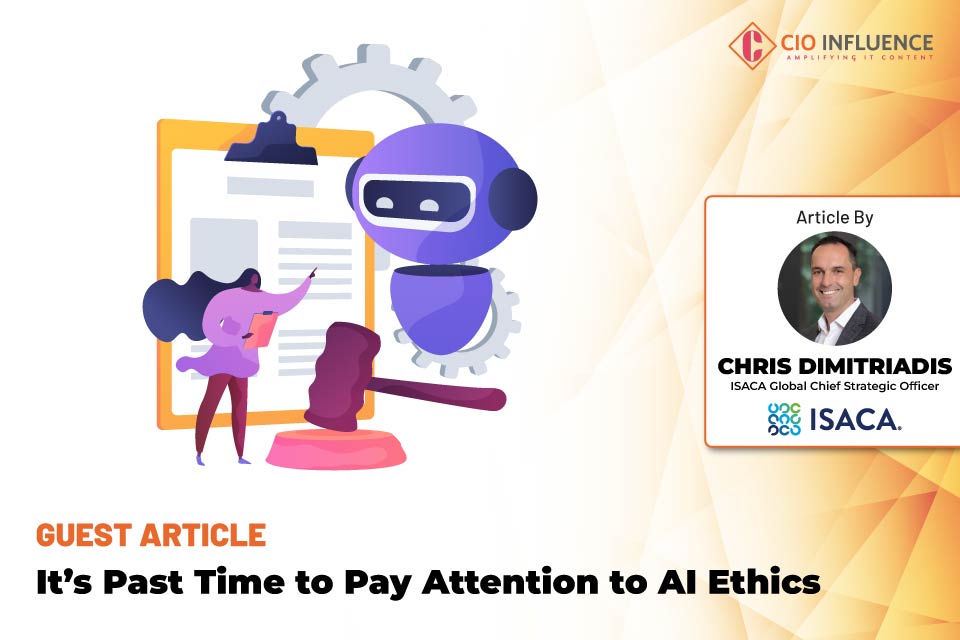Far too many organizations have been racing a car without any brakes when it comes to AI implementation and use. To avoid a spectacular crash, it’s time to do things in the right order—and that means paying better attention to AI ethics. Just like brakes enable a car to confidently go faster, strong ethics and good risk management are what enable organizations to move quickly and win when it comes to AI. In a recent AI pulse poll conducted by ISACA, only 34% of the digital trust professionals surveyed say organizations are giving sufficient attention to AI ethical standards. This indicates that two-thirds of organizations need to strengthen their focus on ethics within AI, a gap that can lead to significant risks and a loss of trust if left unaddressed.
Foundational Principles for AI Ethics
Ethical standards and guidelines have been developed by governments and organizations around the world. For example, the European Commission has set four principles: Respect for human autonomy, Prevention of harm, Fairness and Explicability (transparency), event before the AI ACT came into force . In another example, the US DoD has adopted five principles: Responsible, Equitable, Traceable, Reliable and Governable in order to define ethics in AI. There are more guidelines and definitions that are centered around respecting human rights, however, what is not common sense yet (although mentioned in the guidelines) is that cybersecurity and the overall protection of the AI algorithm, is a key component towards supporting the ethical principles around AI, in order to avoid harm, misconduct, privacy breaches through attacks against the confidentiality, integrity and availability of the AI system.
Creating an Ethical AI Policy
Ethics should be embedded into every step of policy development, particularly for AI policies that generate application given the depth of their content creation. Here are basic elements to consider when building ethical AI policy.
- Approach Core Ethics: First of all, a sound AI policy should address ethical principles in line with organizational values that can prevent harm. Secondly, the assessment of various AI tools for possible risks in creating or reinforcing biases needs to be considered. Further, responsibility should lie on the members of the team to explain the processes and decisions of AI, thus building up a culture of digital trust.
- Defining Acceptable Use and Behavioral Standards: It’s about setting clear parameters on the use of AI that are and are not acceptable. What’s more, organizations should outline suitable uses of AI that meet business needs but still keep within the legal boundaries of privacy and ethics. Policies should denote intended uses of AI, forbidden uses, and industry context since this will often decide what is acceptable.
- Development of Data Handling and Training Guidelines: Data quality and ethics are considered the most critical ingredients in building responsible AI. Any such policies must detail sourcing, processing, and management of data with a strong focus on anonymizing personal data so individual privacy is protected. Because the quality of the data affects accuracy and reliability of the outcomes, treating the data with due care ensures AI systems make decisions that are trustworthy and unbiased.
- Promote Transparency and Attribution: Policies should also facilitate transparency, especially in the use of the content created by generative AI. Clear signals, including watermarks, would indicate AI-generated content versus human-created material. This accountability in the production of AI-generated content should be clearly distributed within an organization to ensure it is always checked and then cleared before release to maintain accountability.
Also Read: CIO Influence Interview with Tyler Healy, CISO, DigitalOcean
Practical Steps for the Implementation of AI Ethics
Organizations that are serious about the proper use of AI can go ahead with some steps that will further enhance their ethical approach. The key practical recommendations include:
- Regular Ethical Audits: Periodical review of AI systems helps in proactive identification and mitigation of risks.
- Employee Training: Knowledge sharing with the team regarding AI ethics ensures a uniform approach toward responsible practices.
- Ethics Committees Across Departments: Representation from IT, Compliance, and Legal will bring variety of thoughts in the policy development for ethics in AI policies.
- Industry Alignment: Industry standards and best practices are necessary for responsible AI ethics policies.
Ethics in AI frameworks are more than a precaution but a pathway to sustainable growth, innovation, and trust. Responsible practices assure that an over-increasing reliance on AI by organizations keeps AI as an asset rather than making it a source of risk. An ethical approach toward AI not only minimizes potential harm but also reinforces the reputation and stakeholder relationships an organization has built in today’s digital economy.
Also Read: CIO Influence Interview with Anuj Jaiswal, Vice President of Products at Fortanix
By putting ethics first throughout the whole lifecycle of AI, organizations are empowered to innovate responsibly and through challenges toward a balance that benefits business and societal well-being. As AI continues to shape future landscapes, embedding ethics right into the base is necessary for long-term positive impact.
[To share your insights with us as part of editorial or sponsored content, please write to psen@itechseries.com]


